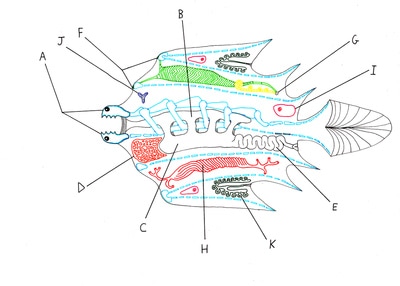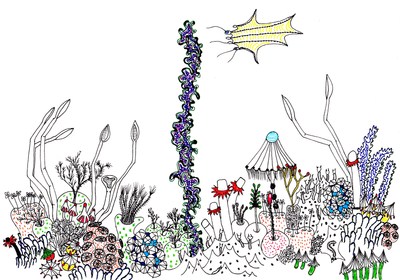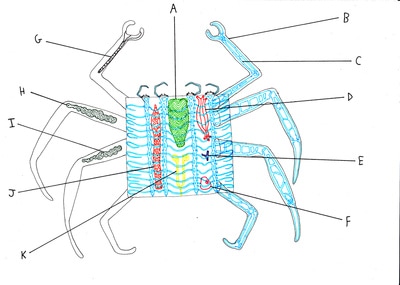|
Species is less of a video game than an evolution simulation program. One can simply sit back and watch creatures adapt and speciate or one can introduce selection pressures to see what happens. Challenge yourself to evolve something resilient. Among other things, players can change the oxygen levels, temperature, sea levels, and radiation. Changes in terrain can force creatures to expend more calories in order to move. Specific attributes can be added to the gene pools of any population, including not only shape and color, but sex drive, the maximum genetic distance allowable for successful mating, and metabolism – affecting secondary traits such as how often they sleep and how much food they need to keep from going extinct. The software tracks phylogenetic history to produce cladograms and comes with a DNA toggle board. It looks awesome.
0 Comments
There are many awesome artists on DeviantArt.com, but not all of them have well-defined exobiology projects. Some focus on the behaviors and outside appearance of long-extinct organisms on Earth. Some engage in all kinds of art and mix all their work together. Some post great alien pictures, but give no descriptions or environmental context. Some deal more in fantasy than science fiction. Some only had a few good ideas and then stopped. Some create strange landscapes covered in what might possibly be plants perhaps inspiring someone else to offer design and explanation. Here are those that at least deserve recognition as artists:
Demmmmy is the creator of Fentil, an Earth-like planet of higher gravity and thicker air. It is the flora of planet Fentil I am most enamored with. There are plants that grow at the top, creating gigantic basket-like structures. There are plants that breathe. There is good fauna, too. There are the complex skeletons of the Dystroma and the complex vascular systems of the Photonimals. They are both highly creative and surprisingly plausible.
Spore is a computer game of five levels. First, the player creates a unique aquatic microbe that must survive the hardships of nature. Continual tweaks can help it to better thrive in its environment. Next, it becomes a land-based creature. Next, it develops social groups. Next, it develops technology. Finally, it colonizes space and this level is played against other empire-builders online. I can’t rate it because I’ve never played – I don’t have time or patience to learn structured games – but it sounds fun.
Salpfish1 is the creator of several worlds, including Tregama, home of swimming creatures with siphon-legs and the charybdis fish, which uses suction to create whirlpools and feed on anything on the water’s surface. He also creates a variety of future Earth animals, such as land anomalocarids, fish-like mollusks that eat anemones and then spit stinging cells at predators, and pigs that hunt like frogs. Another favorite of mine is the blind, flying, cave shrimp.
If you are a world builder who needs to ground your life form designs in scientific plausibility, the podcasts at BEKernWrites.com are a good place to start. Each runs about forty minutes long. Subjects such as biomes, metamorphosis, metabolism, and genetic material are covered by an actual professor of biology. The lectures stick pretty close to describing Earth life most of the time while briefly mentioning some of the variations found across the galaxy. It is not wildly speculative.
Nearly all life in the galaxy is descended from the same ancestor through the process of panspermia – and something is trying to kill it. The Sage of Sagittarius by Kenn Brody is a fast read. It is full of scientific details, but without slowing down the action at all. The end is satisfying without being too unrealistic (the “bad guy” is destroyed, but at a heavy cost). Each twist makes sense in the context of the story. The characters are quirky, yet believable, and fairly well developed without getting bogged down in a lot of internal musings – nothing wrong with that, but this book’s focus is on the struggle for survival between species of radically different biology (and physics).
In the course of the story, the characters encounter many alien ecosystems. I liked the mollusk-like beings that sift gold from the sea. I liked the “birds” that planted themselves into the ground and became trees. I liked the centipede-like creatures that kept harems. I loved it. Concavenator is the creator of Horus, a world connected to Victorian-era Earth via wormhole. It is home to red plants with hearts, tube-jet fish, and large land vertebrates. The animals have a double spine. The dorsal spine runs from the skull along the back, while the ventral spine runs from the chest along the tail. They are connected by ribs. The tail houses the respiratory and sometimes reproductive organs. The land animals have six limbs. Some run on the hind limbs and use the forward limbs for grasping while the middle limbs are vestigial. Others stand on the front limbs while the rear four are used as wings. My favorite is the lazy animal that uses its front limbs to carry its head around while it grazes.
Tapejara is the creator of not one, but six worlds, including Tunjera, Adam, Eve, Lyell-3, Toci-1, and Midgard. They are currently all unfinished but all have huge potential. The animals are very creative. Planet Adam is home to “fish” with large ventral “mouth-bodies” attached only by a narrow tube containing the esophagus. Planet Eve is home to completely armored creatures whose only openings (the mouth and anus) are both located in the head. Some are colonial. Toci-1 is home to animals with chain-link ribcages, helical muscles, and specialized organs capable of regenerating any damaged tissue anywhere in the body – as if all the stem cells were in one place.
Abiogenisis is a mind-blowingly good artist in general but especially of alien sea life. My favorites are the swordswallower, bushwacker, cloakmouth, and antlerworm. I hope these eventually get organized together in an Expedition-style book someday.
Avancna is the creator of planet Tlaquanaru. Although the map proves it is certainly not Earth, the animals are eerily similar to those of our world. There are what appear to be descendants of iguanas, birds, moths, and very many fish. My favorites are the rolling echinoderms and the rotifer-cephalopod-creatures that drop pom-poms full of ammonia to deter predators.
Ramul is the creator of Red Earth, a planet about halfway between Earth and Mars in all its characteristics. It is home to a staggering number of octopod species, but my favorites are the worm grasses (plant-like animals), siltribbons (worms with long mouths that suck up muck), monolingulates (filter-feeding squid-things), and the era worms, which are known to hatch all at once and secrete a poison that kills everything around them.
Biofauna25 is the creator of not one, but two worlds, Epimethius and Odin. Either project has the potential to be a great book.
Epimethius is a larger, stormier version of Earth. There are at least four lineages of plants, including the ridge-leaves, the maze-roots, the feather plants, and the peeling plants. There are an incredible variety of radially-symmetrical animals, some resembling insects, crustaceans, mollusks, amphibians, and mammals. Variations on the theme include laterally flattened shrimp-like forms (making them bilaterally symmetrical) with their eyes on the back end. There are even more bilaterally-symmetrical animals. They have dual ribcages. The ventral ribs house the digestive organs and the dorsal ribs house the heart and respiratory organs. Many resemble fish and snakes. Others resemble deer or crocodiles. Some make silk, some retract their heads into hoods, and others have their simple mouths in the chest. My favorites are probably the frog-like potes. Odin is a small, relatively dry planet largely covered by inedible sheddings of red plants floating in the air. Different species of floating plants receive energy from sunlight, lightning, or wind motion. They form wide nets to safely diffuse electrical discharges. There are three main groups of animals. The first has a four-stage life cycle, the second has a five-stage life cycle including a sessile phase that feeds the young with nectar, and the third has a five-stage life cycle like the others, but in reverse. I don’t know exactly how he organizes them into groups, but I estimate there must be at least twenty-seven orders. Juniorwoodchuck is the creator of Aurora, planet with long days and animals which spend one life stage as a plant. He also speculates about future Earth life, my favorite examples of which are the turtles that swim with their necks and the squid-moles.
Snaiad is an exobiology project created by C. M. Koseman. The planet Snaiad is inhabited by many creatures, of which the vertebrate phyla are described on the website. These animals have hydrocarbon bones, hydraulic muscles, endocrine-based cognition (as opposed to neural), and two heads. The lower heads are mostly boneless and used for eating. The upper heads are actually heavily modified genitals used for defense and covered in sensory organs. There has been talk of turning it all into a book. I really hope this happens, but only if the invertebrates, plants, and microbes are also described.
Planet Epona is a dying world with only periodic volcanism. It is during these short bursts of ten million years or less that life flourishes and diversifies. Otherwise, it survives only in the seas where it can barely scrounge up enough carbon to grow. There are several lineages of plant and animal life, including bubbleweed, tiered seaweeds, pentapods, bivalve ambush predators, and colonial flying insectoids. The pentapods and tiered land plants make use of bone-muscles that expand rather than contract. They have variable metabolisms based on interesting biochemistry. While the project seems to have stalled, it can always be revived and in any case is worth the read.
While it doesn’t exactly have the most original plot or most complex characters, the setting of the movie Avatar is really interesting. I enjoyed the special effects and the feeling of immersion in a rich variety of growth. There were glowing plant-things and insect-things. There were also some strange megafauna. My favorite were the flying dinosaur-like beasts. Furthermore, all the trees were connected by some sort of communication system that allowed the entire biosphere of the planet Pandora (actually a moon in orbit around a gas giant) to act as a single brain. This brain physically connected with various animals at various interface nodes. The animals were capable of linking with each other even across species through specialized organs that resemble bundles of fiber-optics. Pandora is definitely a place I wouldn’t mind visiting.
If you need some guidance in creating scientifically accurate and plausible habitats and organisms for your exobiology project, the Speculative Evolution Wiki is a great resource to start with. There is a page on the types of alien planets thought to exist. There is a page on alternative biochemistries. There are pages covering the wide variety of approaches Earth life takes to common problems, such as movement, perception, reproduction, defense, and the various ways that an organism might draw energy from its environment.
The Future Is Wild is a book (and television miniseries) exploring what life might be like five million, one hundred million, and two hundred million years from now. Squids evolve to walk on land. Fish evolve to fly in air. Slime molds trap and dissolve passing flyers. Corals are replaced by red algae. Jellyfish are huge. Sharks are social. Birds spit fire. The movement of the continents has much to do with natural selection and this is part of the story too.
Artist Emily Holland is writing a trilogy about a human expedition to the planet Ilion, a tidally-locked planet of mobile red plants and colonial ambush predators. Sunrise On Ilion is her official website where you can watch the project as it unfolds. She covers the geography, climate, geology, and especially the biology of this fascinating planet. You can also follow her on her DeviantArt page.
Gert van Dijk and Sigmund Nastrazzurro create the Planet Furaha website (also known as Phoenicis 4), detailing the astronomy, climate, geography, and biology. There are maps of various projections and many animations showing the complex way the animals walk, swim, and fly. There are radially-symmetrical animals and bilaterally-symmetrical animals. There are also interesting plants. There are anecdotes from the lives of the biologists living there. I really hope it turns into a book. Sigmund also writes a separate blog on graphic design and speculative biology in general.
Wayne Douglas Barlowe is an artist and the author of Expedition, the story of mankind’s visit to planet Darwin 4, home of large, blind, sonar-using liquivores. His paintings of alien plants, animals, and landscapes are amazing. He describes their physiology and behaviors. This is one of my favorite books that I dig out of storage from time to time just to look through. It has inspired me to make my own exobiology art books out of my old doodles, but at the moment I am far too busy.
The trends on Darwin 4 include large size and leg reduction. Some animals have six legs, others four, and others only two. Many have their rear legs fused into one or else have keels to support their weight. Others have their front legs fused into one. The gyrosprinter has both its rear and front legs fused, leaving it with two legs in a row. There are even monopods. Most animals are hermaphrodites, eyeless, rely on sonar, and digest meals outside the body before sucking them up, though there are exceptions to all of these trends. I think my favorites are the tundra creature whose head detaches to become a flying animal while the lower body becomes nothing more than a living shelter, and the groveback – a creature that spends its life sleeping and growing underground while trees cover its back. Barlowe also paints demons, hellscapes, and other awesome things and is available for commissions or licensing. Check out his website. |
Like alien art? Check out my store.
Copyright © 2017



 RSS Feed
RSS Feed